Het is zomer op de Zuidpool maar de zeeijsdikte is hier 26 procent dikker dan gemiddeld over de laatste decennia. De Volkskrant meldt hoe nu al 2 ijsbrekers niet slagen om de in 3 meter dik zeeijs vastgelopen Zuidpool-expeditie van de Akademik Shokalskiy met zes ‘wetenschappers’ vrij te krijgen. Deze ligt sinds kerstavond vast.
Bij iedere smeltende ijsbeer staat de Volkskrant vooraan te melden dat het uw schuld is, ditmaal verzwijgt de kwaliteitskrant de reden van de expeditie: de aanwezigen onder leiding van schrijver en klimaatactivist Chris Turney, van CO2-techbedrijf Carbonscape volgden de in 1912 ondernomen expeditie van avonturier Douglas Mawson, waarbij Turney het huidige missiedoel als volgt omschrijft:
repeating century old measurements to discover and communicate the environmental changes taking place in the south.
Het is een Global Warming-communicatieproject. Dit is wat Turney op zijn eigen site schrijft:
I am an Australian Research Council Laureate Fellow and Professor of Climate Change at the University of University of New South Wales where my team and I are focussing our efforts on using the past to better understand the changes we are seeing today. To do something positive about climate change, I helped set up a carbon refining company called Carbonscape which has developed technology to fix carbon from the atmosphere and make a host of green bi-products, helping reduce greenhouse gas levels.
Turney schreef een avonturenboek ‘1912’
The rivalry between Robert Scott and Roald Amundsen is a familiar story; what fewer people know is that, in 1912, five separate teams were exploring beyond the limits of the known world: Scott for Britain, Amundsen for Norway, Mawson for Australasia, Filchner for Germany and Shirase for Japan. The Antarctic discoveries made by these brave explorers enthralled the world and forever changed the way we understand our planet.
In zes weken tijd wilden zij turbowetenschap bedrijven:
We are going south to:
-
gain new insights into the circulation of the Southern Ocean and its impact on the global carbon cycle
-
explore changes in ocean circulation caused by the growth of extensive fast ice and its impact on life in Commonwealth Bay
-
use the subantarctic islands as thermometers of climatic change by using trees, peats and lakes to explore the past
-
investigate the impact of changing climate on the ecology of the subantarctic islands
-
discover the environmental influence on seabird populations across the Southern Ocean and in Commonwealth Bay
-
understand changes in seal populations and their feeding patterns in the Southern Ocean and Commonwealth Bay
-
produce the first underwater surveys of life in the subantarctic islands and Commonwealth Bay
-
determine the extent to which human activity and pollution has directly impacted on this remote region of Antarctica,
-
provide baseline data to improve the next generation of atmospheric, oceanic and ice sheet models to improve predictions for the future
Turney is een goede verhalenverteller en doet waar hij in gelooft: dat is beter dan bureauplakken. Maar ditmaal heeft de ironie van de natuur hem ingehaald.

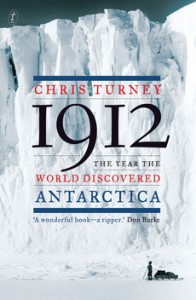
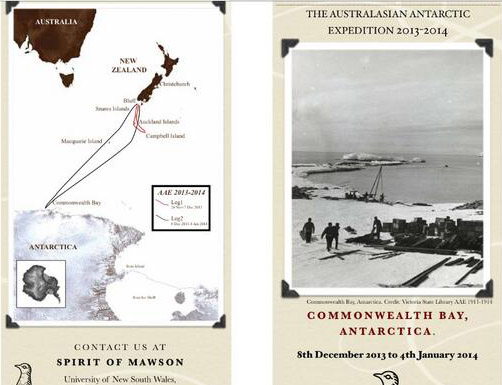

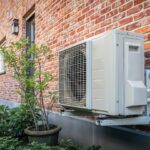
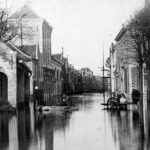

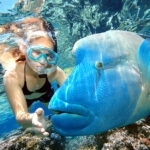
Je was me net voor, kan ik tenminste een keer On Topic reageren, gansje van het NOS Journaal wist net te melden dat drie ijsbrekers er niet door komen maar toch niet de correlatie kunnen/willen/mogen leggen/begrijpen met de 6 graden dodelijke opwarming die maar niet komt.
Hoera
Laat ze maar een winter zitten dan kunnen we zie hoe koud het zal zijn.
Nu nog een paar schepen die rond het noordpool ijs willen varen.
Ook daar begint het langzamerhand weer echt dicht te vriezen.
’t Vriest weer dicht op de Noordpool, maar nog niet echt voortvarend als ik op Athony Watt’s Sea-ice page kijk. Sinds september twee periodes gehad met een afvlakking op meerdere grafieken. Zeewater van de Golfstroom lekker opgewarmd met alle zon van de afgelopen zomer :)?
Alex B;
check gewoon even de feitelijke metingen (zouden de AGW proponenten eens een gewoonte van moeten maken, worden ze vanzelf “realist” :-) ).
De golfstroom is aan de oppervlakte niet warmer dan normaal ( http://www.ospo.noaa.gov/Products/ocean/sst/contour/ ) en de lucht temperaturen rond de noordpool worden al sinds 1958 bijgehouden door het Deense KMI ( http://ocean.dmi.dk/arctic/meant80n.uk.php ), ook hier zie je dat de zomers geen opwarmende trend vertonen. De hoofdreden van het afnemen van het noordelijke zee-ijs-oppervlakte is wind, die het ijs in warmer water drukt.
Ha ha, Vlieggek, wil je even ophouden met schelden alsjeblieft :)? Als ik AGW proponent was zou ik hier echt niet al zo’n vier jaar komen hoor en ook niet op WattsUpWithThat. Anthony’s Sea Ice Page geeft een behoorlijk aantal grafieken weer van verschillende instituten mbt het zeeijsoppervlak en ook de temperatuurgrafiek van DMI die jij weergaf. Ik had het ook liever anders gezien maar de aangroei gaat sinds november (niet september zoals ik schreef) nogal hakkelig en daar zullen de stormen die we gehad hebben zeker debet aan zijn. Mijn opmerking was dus niet om te trollen, maar gebaseerd op info van (voor mij in ieder geval) onverdachte bron.
Hey Alex, ik scheld toch niet ;-).
De opmerking voor en over AGW proponenten, was algemeen bedoeld. Vergelijk de ijsaangroei data eens met grote lage- en hogedrukgebieden die voor een stevig stuk stroming kunnen zorgen in dat gebied. In de meeste gevallen komen die goed overeen.
The Graudian heeft de euvele moed de huidige situatie met die van Mawson 100 jaar geleden te vergelijken :
Lees hier wat Mawson meemaakte en maak de vergelijking dan nog eens: http://blogs.smithsonianmag.com/history/2012/01/the-most-terrible-polar-exploration-ever-douglas-mawsons-antarctic-journey/
Op de goed verwarmde en comfortabele Akademik Shokalskiy gaat om 4 uur de bar open om de reizigers onder het genot van een glaasje de verschrikkelijke omstandigheden waarin zij verkeren nog eens te bespreken en het vooruitzicht dat men desnoods met de helicopter uit hun benarde omstandigheden worden bevrijd.
Is Al Gore aan boord? ;-)
ROFLOL
Bevind ik me hier bij de ontkenningsindustrie? http://www.nrc.nl/klimaat/2013/12/24/de-ontkenningsindustrie/
G.Key, waar blijft mijn betaling/subsidie?
Nou G.Key; ik ben heel benieuwd naar het 2e en 3e deel van dat “onderzoek”, want het is algemeen bekend dat wereldwijd de AGW-industrie vele malen meer geld krijgt dan de klimaat-realisten. Zelfs BP en Shell geven heel veel meer geld aan alarmisten dan aan realisten. Lees je eerst eens effe in, voordat je zo intelligent door de bocht komt….
De ontkenningsindustrie versus klimaat-alarmindustrie?
“Klimaat-alarmindustrie-publieke-media-circuit”=”Bureaucratisch- gepolitiseerd-academisch-klimaat-industrieel-complex”:
Er zijn 170 overheden van de wereldlanden, die het Kyoto-protocol hebben medeondertekend en financieel bijdragen aan de Kyoto-organisatie , bijdragen aan de zgn. wereld-Kyoto-klimaatconferenties en aan de VN-IPCC-organisatie.
De uitvoering en legitimatie van het Kyoto-protocol is qua funding afhankelijk van de sterk alarmistische klimaatrapporten door het IPCC. Het IPCC is een politiek voorgesorteerde VN-adviesorgaan, dat elke 6 jaar een (steeds minder alarmistisch, gedwongen door feitelijk geen significante opwarming meer sinds 1998!) uitbrengt, om de klimaat-subsidiegeld-circulatie in stand te kunnen houden.
Elk van de 170 Kyoto-verdagslanden heeft een of meerdere NGO’s die elk met een paar miljoen $ per jaar worden door hun overheid gesubsidieerd of door de VN, zoals de vele Afrikaanse landen, mede ondertekenaars die op extra ontwikkelingsgelden rekenen via hun ondertekening
De schatting van de omvang van de totale subsidies aan het georganiseerde/ geregisseerde gepolitiseerde klimaatalarmisme-circuit is een ondoorzichtige geldstroom, van naar schatting 50 tot 100 miljard $ per jaar.
Vergeleken met het “Bureaucratisch-gepolitiseerd-academisch-klimaat-industrieel-complex”, dan is het budget van de “AGW-ontkenningsindustrie”, zo die al bestaat, in het rapport door Brulle echt een lachertje!!!!!!!!!!!!!!!!!!!!!! Kan bovenop op de stapel van Stapel en Vonk!
nl.wikipedia.org/wiki/Lijst_van_ondertekenaars_van_het_Kyoto-protocol
Ik heb zojuist het artikel van Luttikhuis gelezen. In een woord: beangstigend.
In plaats van in te gaan op de legitieme argumenten van sceptici worden sceptici weggezet als een ’tegenbeweging’. En niet zomaar een tegenbeweging maar ‘netwerken van individuen en organisaties’ die ‘door anonieme giften de beschikking [hebben] over ruim 900 miljoen dollar’ waarmee ze ‘belangrijke bijdrage hebben geleverd aan het falen van de wereld om actie te ondernemen tegen klimaatverandering’.
De strekking is duidelijk: tegen dit sinistere complot zijn doortastende maatregelen nodig. Uit de media houden is wel het minste. Gezien het vaststaande feit van de AGW moet het wel zo zijn dat de weerstand van deze mensen sociaal geduid moet worden. Een stukje ‘heropvoeding’ ligt dan voor de hand.
Brrrr. Ongeacht je positie in het AGW debat moet je toch zien hoe eng dat werkje van Brulle is.
En daar wordt nog steeds het etiket wetenschappelijk aan geplakt
Zat Stapel in de jury?
Een redelijk goede samenvatting van het hele gebeuren staat op: http://climate4all.wordpress.com/
Er werd geclaimd dat de expeditie al aan land was geweest, maar dat blijkt nu met ATV’s (Argo’s) gedaan te zijn om de laatste 65 (!) km naar het vaste land af te leggen.
Ik ben trouwens benieuwd wie de rekening van deze reddingsoperatie gaat betalen. 3 ijsbrekers die al dagen proberen bij de schip te komen, dat gaat al in de miljoenen lopen. Ik denk trouwens dat deze “dot.com wetenschappers” geen idee hebben van het gevaar waar ze momenteel in zijn, en in welk gevaar de redders zich moeten begeven……
Als ik naar de verf op de boeg van het onderzoeksschip kijk, heb ik het idee dat ze al behoorlijk aan het ijsrammen zijn geweest om door dat “gesmolten zee-ijs” te komen. Het schip ligt trouwens ook behoorlijk onder helling.
Ik lees net op nu.nl, dat de meeste mensen van boord gehaald gaan worden door een chinese helicopter als het weer wat beter wordt. Als de foto’s kloppen gebruiken die een russische Kamov (twin-rotor), dus worden dat ca. 10 tot 15 vluchten om de passagiers en non-essential crew te evacueren. Er is, zover ik kan zien, geen heli-dek op het schip, dus kan de pick-up alleen op het ijs, dus met de nodige risico’s (scheurend ijs door rotor-druk). Dit is een heeeeele dure ondernemening met risico’s, dus neem ik aan dat de kapitein zich grotere zorgen maakt als de “wetenschappelijke” passagiers. Het wordt wel erg “stereotype”, deze onderneming…..
Daar gekomen met/dankzij fossiele brandstof
Drie reddingspogingen met/dankzij fossiele brandstof
Helicopter vluchten met/dankzij fossiele brandstof
Ja ,ze maken zich niet zo druk om onze aarde dan ze willen bewijzen .Maar ik weet het wel hoe ze het kunnen bewijzen .Gewoon een raket op het schip en het laten zinken is de goed kooptste oplossing en scheelt gewoon te gek veel co2 om het niet te doen ruimt weer lekker op .Dat willen ze toch alles voor de aarde niet :D
@Vlieggek
Aangezien het een schip uit Rusland is zal Rusland de rekening wel moeten voldoen.
Daarvoor kunnen zij de borgsom, door Nederland (Timmermans!) betaald voor de Arctic Sunrise gebruiken.
Arctic Sunrise krijgt waarschijnlijk geen gratie, het zou dan een toekomst hebben van roesten aan de ketting. Dat beeld spreekt mij aan.
Eindelijk ook weer eens goed nieuws !
Een schip roest voornamelijk van binnen , nl. in de ballast tanks. Dit tast de sterkte van het schip aan. Zou het Greenpeace net zo vergaan?
Die zijn al van binnenuit verrot.
2 interessante links in deze om te lezen:
http://motls.blogspot.com.es/2013/12/alarmists-stuck-in-antarctica-will.html#
http://tallbloke.wordpress.com/2013/12/29/mawson-never-had-this-trouble-83-years-ago/
Ik heb het prachtige plaatje van de^mol’s link er even bijgezet.
Van dit soort nieuws en het proza erover (beide links zijn leuk) kan ik nou echt blij worden ;-).
Deze is ook leuk (had ik al gepost onderaan de eerste link):
http://climate4all.wordpress.com/
“No, they had not reached Mawson Hut by ship, but by Argo! Some 40 miles from their destination, they unloaded their ATVs and trekked the last 65 km to reach their destination.”
Haha, ze wisten dus allang dat er veel meer ijs lag dan een eeuw geleden, ze moesten 65 km over zeeijs om met een Argo de plek waar Mawson landde in Commonwealth bay (waar geen zeeijs lag) te bereiken. En daarna werden ze door zeeijs ingesloten. Karma is een bitch.
Hier leveren de AGW adepten zelf het bewijs dat ze over zeeijs de hut wisten te bereiken (een bewijs van mijn comment van december 31, 2013 1:42 pm):
https://www.youtube.com/watch?v=EHoIbRBW6go
Prachtig hoe die gasten zelf het bewijs leveren van TOEGENOMEN ijshoeveelheid de afgelopen eeuw (want een eeuw geleden zette Mawson zijn hut bij open water, zie foto hierboven).
Helicopter redding uitgesteld nu een tweede schip ook vast zit in het ijs: http://www.smh.com.au/travel/travel-incidents/helicopter-rescue-delayed-as-second-ship-trapped-in-ice-20140102-306yj.html#
hihihi mooi heh moeder natuur :D .Zoiets als boontje komt om zijn loontje lol.
Als ik die doelen 1 t/m 9 lees dan denk ik: hoe gaan ze dat doen?
Volgens mij heb je voor sommige punten jaren van uitgebreide metingen nodig.
En daarna nog jaren om alles te analyseren.
Maar ja wie ben ik?
Ik zie nu al uit naar de koolmeesjes in mijn achtertuin aankomend voorjaar die elk jaar 1 a 2 nestjes bouwen en 5 a 10 jongen grootbrengen terwijl dat al jaren niet meer kan (officieel gezien dan) vanwege het te vroeg uitkomen van rupsjes door Global Warming.
Harry